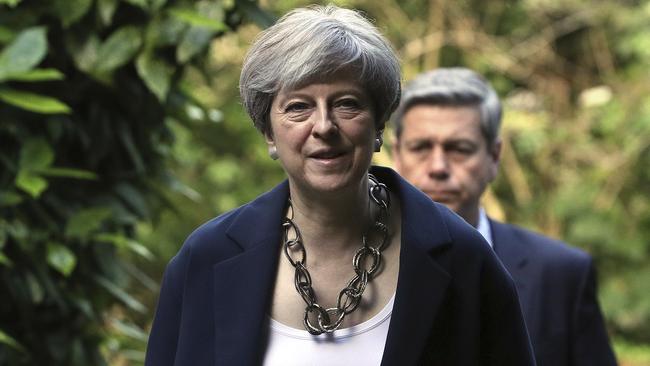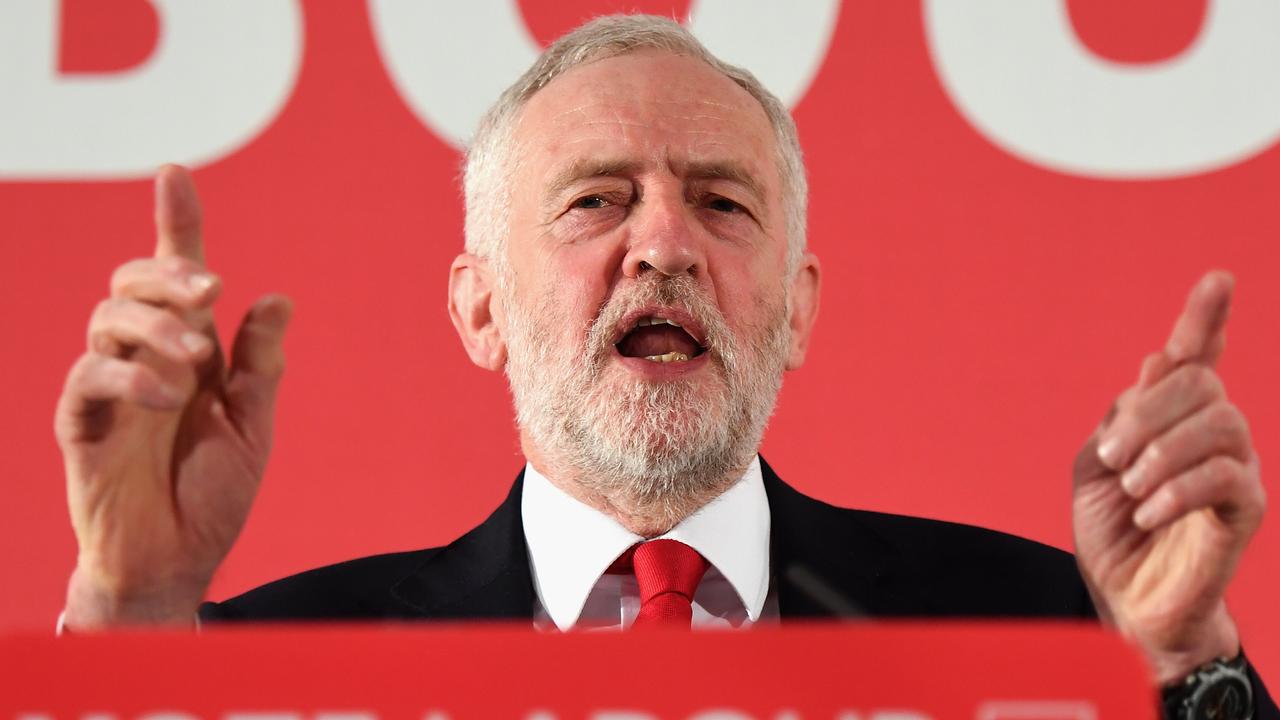May to pay price for poll gamble
Theresa May faces demands for a watered-down Brexit from the powerbrokers who materialised after Friday’s UK election.

Theresa May faces demands for a watered-down Brexit from the powerbrokers who materialised after Friday’s British election as fractures emerge in the alliance with the Northern Irish Democratic Unionist Party and the Scottish Conservatives.
The Prime Minister’s precarious hold on power — over Britain and the Conservative Party — relies on her ability to appease pro-Brexit and Remain MPs while keeping the extreme elements of the DUP at bay, recalibrating the government’s Brexit position for the start of negotiations with the EU next Monday.
After squandering a 20-point lead in polls to fall eight seats short of a parliamentary majority, Mrs May will face angry backbenchers tomorrow with the new version of her hard-Brexit manifesto she offered to the electorate.
Last night, Labour leader Jeremy Corbyn said his party was preparing for another British election that could be held “later this year or early next year’’.
“We have a chaotic situation: the government sought the election for a bigger mandate and we have got a minority government relying on the DUP with no agreed position on most issues. It is quite chaotic,” he said.
“(An election is) quite possible later this year or early next year. It’s a good thing, we cannot go on with great instability.”
Furious Tory MPs are also pushing for a new leader, with support already swinging behind Foreign Secretary Boris Johnson and Brexit Secretary David Davis.
Mr Johnson said it was “tripe” he was moving against Mrs May, but the manoeuvring by others could come to a head at the party conference in October, if not before.
Mrs May has already succumbed to pressure from her cabinet and sacked her two closest advisers, Nick Timothy and Fiona Hill, who were blamed for serious misjudgments on the Tory campaign, including the disastrous plan to force the elderly to pay more for their healthcare.
In parallels with the 1974 Labour minority government of Harold Wilson — which lasted eight months — Mrs May has scrambled to form a workable government.
She sent Conservative chief whip Gavin Williamson to Belfast over the weekend for talks with the DUP, which had initially indicated it would provide “confidence and supply’’ to back important legislation and the budget.
But tense negotiations continued over the breadth and detail of any agreement, including DUP demands for border-free trade and movement with the Republic of Ireland, an EU member. Other demands included financial assistance for Northern Irish schools and hospitals, and cutting taxes, such as air passenger duty. “We can confirm that the Democratic Unionist Party have agreed to the principles of an outline agreement to support the Conservative government,” a spokesman for Mrs May said.
Yet any deal puts at risk the fine balancing act between Northern Ireland’s British loyalist and Irish nationalist parties, and the “neutrality’’ of the UK parliament.
Conservative backbenchers will scrutinise the details of the DUP deal this week and analyse any shift from a hard Brexit.
George Osborne, the former chancellor and now editor of the London Evening Standard, told the BBC that “Theresa May is a dead woman walking’’.
“I am angry we have gone backwards … undoing the good work of the last 10 years,’’ he said.
Tories were scathing of Mrs May, who had failed to acknowledge the losses triggered by her decision to go for an early election, he said. He also warned the DUP deal was very unstable and would leave the Tories vulnerable in every vote. Mrs May faces arm-twisting from the Scottish Conservatives — who now have 13 seats, ahead of the DUP’s 10 — and who have hinted at breaking away if needed to force a softer Brexit, with the priority being securing trade at the expense of controlling migration.
Mrs May was moved to reassure Ruth Davidson — the gay leader of the Scottish Conservatives — there would be no resisting gay marriage in any deal with the DUP, which is a Protestant, socially conservative party. But the Scottish Conservatives, voted in on a wave of anti-Scottish independence sentiment, said they would spend the next few months assessing whether to form a breakaway bloc in Westminster.
Ms Davidson has demanded an “open Brexit’’ that prioritises free trade.“(Open Brexit) is about making sure that we tear down barriers rather than put them up,” she said. “It’s about making sure we put free trade and economic advancement at the heart of the Brexit deal as we leave.”
In Europe, leaders have piled pressure on the British government to begin Brexit talks. German Chancellor Angela Merkel said: “We want to negotiate quickly, we want to stick to the time plan, and so at this point I don’t think there is anything to suggest these negotiations cannot start as was agreed.”
She said the EU would assert the interests of the remaining 27 member states. On Friday, European Council president Donald Tusk warned Mrs May there was “no time to lose”.
Mr Corbyn yesterday revealed he would oppose whatever measures Mrs May outlines next week in the Queen’s speech — in which the government outlines the laws it hopes to have parliament approve over the coming year — and will pressure the Coalition to have all of its MPs onboard.
He said that after lifting Labour to 262 seats and keeping the Tories to 318, “I can still be prime minister”.
“This is still on. Absolutely,” he told The Sunday Mirror. “We will — obviously — amend the Queen’s speech. There’s a possibility of voting it down it and we’re going to push that all the way. The Tories may be in government for now, but their model and lack of ambition is unsustainable. I’m ready for another general election.’’









To join the conversation, please log in. Don't have an account? Register
Join the conversation, you are commenting as Logout